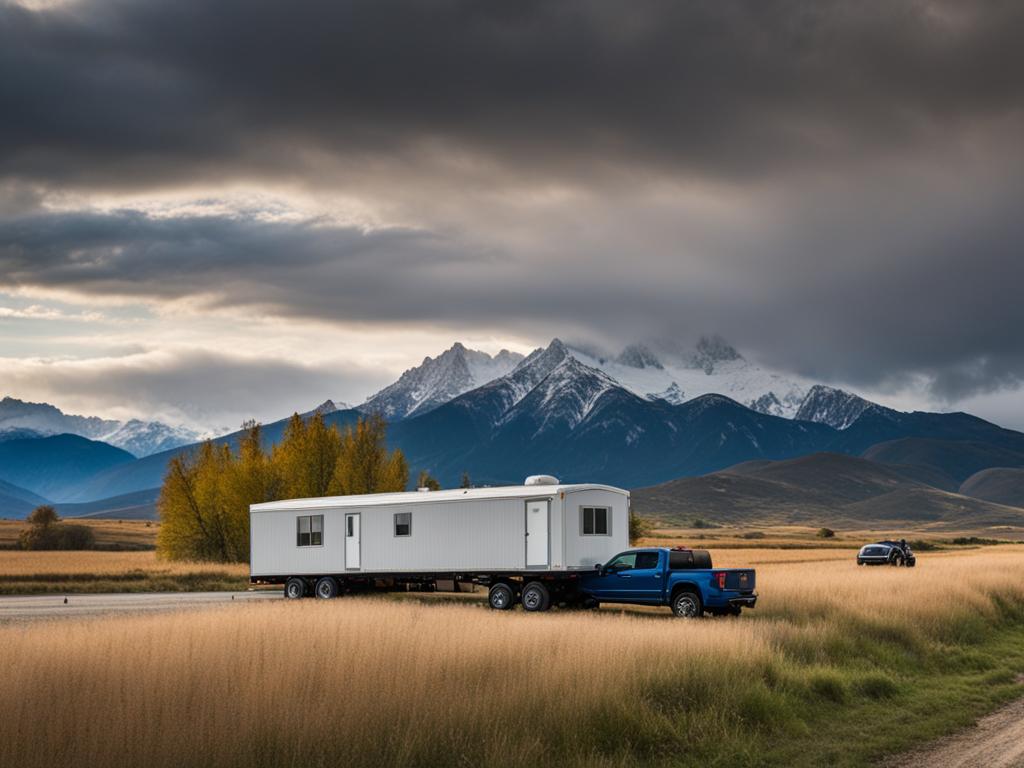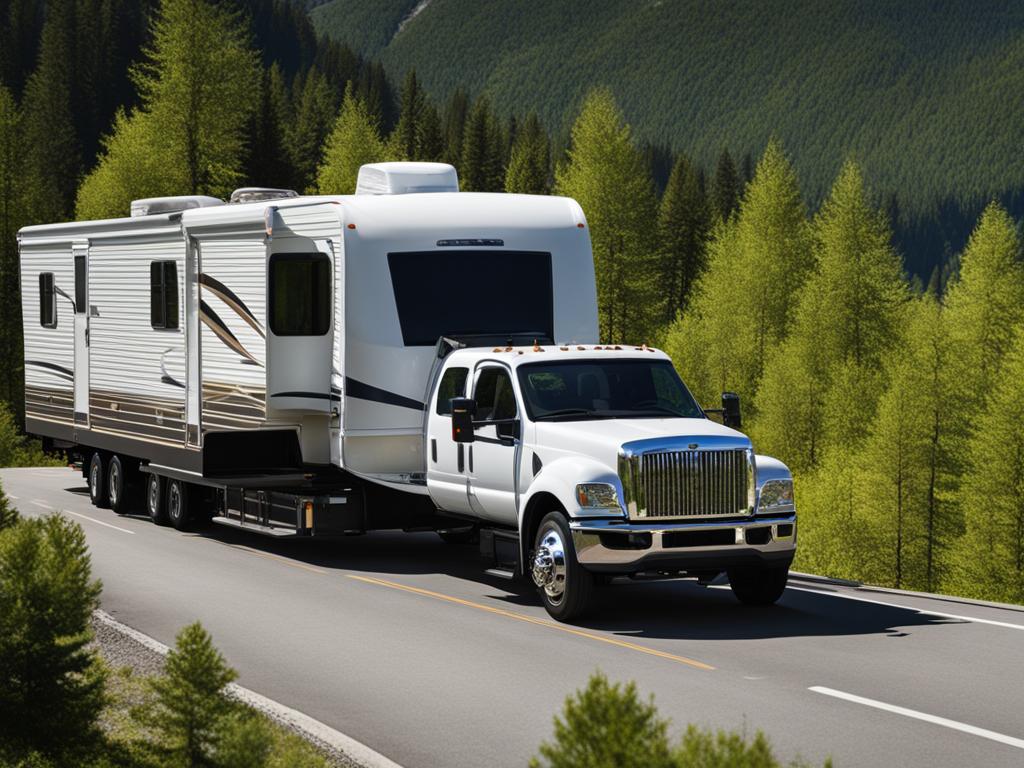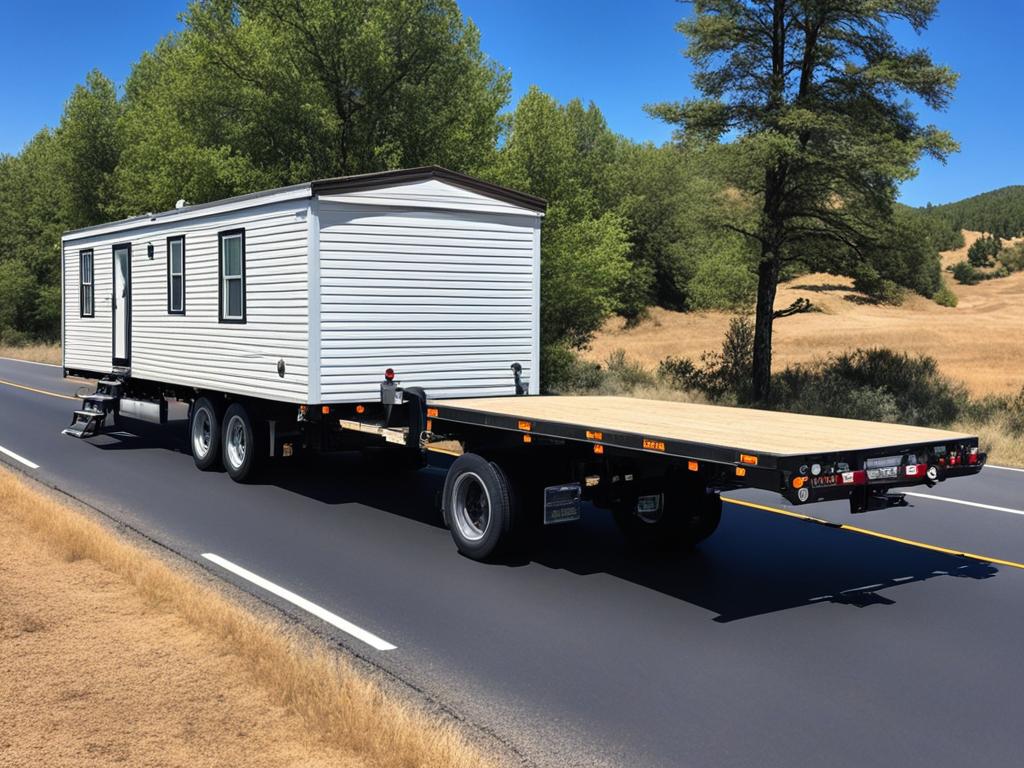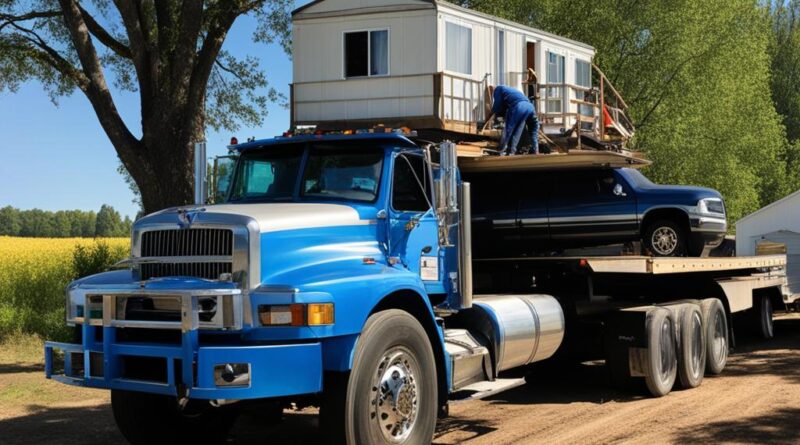Free Mobile Home Relocation: How-To Guide
Are you considering moving your mobile home but are worried about the costs involved? With the average professional mobile home relocation service charging around $7,000 USD, it’s not surprising that many homeowners look for ways to make the move more budget-friendly. If you’re wondering how to move a mobile home for free or at a reduced cost, this guide will provide you with valuable tips and insights to make it happen.
From understanding the importance of skilled and licensed professionals to planning and strategizing for a cost-effective move, this guide can help you successfully navigate the world of mobile home relocation.
Key Takeaways
- Understand the costs associated with professional mobile home moving services.
- Consider DIY mobile home relocation and its legal constraints.
- Explore free and cost-effective mobile home moving options.
- Recognize the importance of professional mobile home movers in ensuring safety and abiding by regulations.
- Learn how to prepare your mobile home for a budget-friendly move.
- Compare long-term benefits and costs when considering free or affordable relocation offers.
- Implement strategic packing and transportation hacks to save on relocation expenses.
Understanding “Move for Free” Offers in Mobile Home Communities
Relocating a mobile home can be expensive, but some mobile home communities offer enticing “move for free” promotions to attract new residents. In this section, we’ll explore the hidden costs, fine print, and eligibility requirements of such offers, helping you make informed decisions about cost-effective mobile home moving options.
Evaluating the True Cost of “Free” Relocation Deals
While free mobile home moving methods may seem like the perfect solution, it’s essential to evaluate the actual expenses involved. These offers may cover specific moving costs, but other charges, such as setup fees, permits, or utility reconnections, might be excluded. Always inquire about what is included in the “free move” and scrutinize each detail to determine the true value of the offer.
Navigating the Fine Print and What to Ask
When considering a “move for free” promotion, read the fine print carefully and ask the community management important questions such as:
- What is the definition of a “free move” in this promotion?
- Are there any hidden fees or charges not covered by the offer?
- What are the long-term financial obligations after the move, such as lot rent, utility charges, or maintenance fees?
- What type of mobile home mover is used, and are they licensed and insured?
Understanding the answers to these questions will aid you in making informed decisions about relocating a mobile home for cheap.
Eligibility Requirements for Relocation Promotions
Before committing to a “move for free” promotion, ensure you meet the community’s eligibility requirements. Criteria may include the age or condition of your mobile home, and not meeting these standards could void the promotion, resulting in unexpected costs. If in doubt, consult with the community management to confirm your mobile home’s eligibility and avoid unwelcome surprises after making a commitment.
Professional Movers vs. DIY Mobile Home Relocation
Moving a mobile home on a budget may leave many homeowners considering the option of moving their mobile home without hiring professional movers. However, there are potential risks and legal considerations that must be taken into account when deciding between a do-it-yourself (DIY) approach or hiring professionals. This section will explore the various factors involved in choosing between the two options and the potential downsides of a DIY move.
Before attempting a DIY mobile home move, it is crucial to understand the legal implications and requirements involved. Various state and local laws often necessitate the use of professional, licensed, and insured movers for such moves.
Attempting a DIY move might seem cost-effective initially, but the overall moving process requires specialized skills and equipment to safely and efficiently relocate a mobile home. Homeowners should carefully weigh the risks, legal constraints, and potential costs associated with unanticipated damages or personal injury that might occur during a DIY move.
To better understand the costs and considerations associated with hiring professionals versus a DIY move, let’s take a look at a comparison table:
| Factors | Professional Movers | DIY Move |
|---|---|---|
| Cost | Can range from $3,000 to $10,000 or more depending on move distance and other factors | Potentially lower upfront costs |
| Risks | Lower risk of damage or personal injury | Higher risk of damage to the mobile home, property, or personal injury |
| Legal Constraints | Compliant with state and local regulations | Potential legal issues if not properly licensed and insured |
| Specialized Skills & Equipment | Capable of moving mobile home safely and efficiently | Difficulty securing necessary skills and equipment |
While the idea of moving a mobile home on a budget without hiring movers might be enticing, it is essential to consider the legal implications, potential risks, and long-term costs associated with a DIY approach. Ultimately, homeowners should take the time to research and compare the costs and logistics involved in both options, opt for the approach that best suits their individual needs, and ensure compliance with all state and local laws.

How to Move a Mobile Home for Free
Moving a mobile home for free may seem like an impossible feat, but there are affordable ways to move a mobile home. Some mobile home communities offer incentives and promotions to encourage new residents to join their parks. These deals can significantly reduce relocation costs or even provide free moving services under specific conditions. This section explores realistic avenues for moving a mobile home at minimal or no cost by capitalizing on these offers, providing guidelines for securing them, and comparing their long-term costs and benefits.
Seeking Out Cost-Free Relocation Opportunities
Many mobile home communities keen to attract new residents offer incentives, which may include free moving services. While these offers can be limited and highly competitive, actively searching for opportunities can lead to valuable savings. Be sure to network with fellow mobile home owners, engage with online forums, and research the industry’s latest news to keep an eye on cost-free relocation options.
Leveraging Community Incentives and Offers
Before committing to a specific mobile home community, it’s essential to capitalize on the incentives and deals offered. To leverage these offers effectively:
- Read the fine print to understand what services are covered by the promotion;
- Ask for clarification on any unclear items;
- Ensure your mobile home meets the park’s eligibility criteria;
- Consider the long-term financial obligations.
Note:
Always remember to negotiate the terms of the deal, as mobile home parks may be willing to go the extra mile to secure new residents.
Comparing Long-Term Costs and Benefits
A free move may seem like a great deal, but it is crucial to examine the potential long-term costs associated with a new mobile home community. Be sure to weigh the following factors against the immediate benefits of a free relocation:
| Long-Term Costs | Immediate Benefits |
|---|---|
| Future rental costs and annual increases | Free moving services |
| Utility costs and fees | Reduced utility connection charges |
| Maintenance expenses | No initial maintenance fees |
| Amenity charges (e.g., recreational facility access) | Free or discounted amenity access |
When moving a mobile home for free or at a low cost, it’s crucial to factor in both short-term and long-term expenses. By comparing financial obligations and benefits, you can make an informed decision and choose an affordable mobile home relocation option that meets your needs.
Steps to Prepare Your Mobile Home for Cost-Effective Moving
Preparing your mobile home for relocation is essential to ensure a budget-friendly and efficient move. Taking the right steps can save you time, money, and potential headaches. Here are some top mobile home transportation hacks and DIY mobile home relocation tips to help you on your way:
- Disconnect Utilities and Services: Turn off and disconnect water, electricity, gas, and any other services you have to your mobile home. This is important for safety reasons and preventing possible damage during transportation.
- Handle Minor Repairs: Address any small maintenance and repair issues, such as loose floorboards or damaged siding. DIY repairs offset costs and prevent additional damage that could occur during transport.
- Manage Personal Belongings: Remove all items from your home’s interior, securely pack and store them, or consider selling or donating unused items to reduce weight and save on transportation costs.
- Secure the Exterior: Remove any external fixtures, including awnings, skirting, or decking, and ensure all doors, windows, and hatches are properly sealed.
- Obtain Required Permits: Research and secure the necessary permits and documentation, such as zoning permits and title certificates. This ensures your move is compliant with local laws and regulations.
- Coordinate with Park Management: Communicate your relocation plans with park management and follow procedures for departing residents. This can help make your transition smoother and avoid additional fees.

Following these steps allows you to effectively manage your budget while ensuring a smooth, hassle-free relocation. Remember, while a DIY approach may be appealing, it’s crucial to rely on professional movers when it comes to the actual transportation of your mobile home. A DIY mobile home relocation could result in unnecessary risks and liability.
In conclusion, taking the time to carefully plan and prepare your mobile home for transport keeps you on track for a budget-friendly moving experience. Cut costs wherever possible, while also maintaining respect for safety and legal regulations, for a successful mobile home move.
Options for Affordable Mobile Home Transportation
Cost-effective mobile home moving options are crucial for those aiming to relocate their mobile homes without breaking the bank. By considering various strategies, you can potentially save on transportation costs and other related expenses. Below are some mobile home moving tips that can help you lower your moving costs.

Obtaining Competitive Quotes and Flexible Timing
One of the most effective ways to achieve cost-effective mobile home transportation is to gather multiple detailed quotes from specialized movers. Comparing these quotes will give you a better understanding of the market rates and help you make an informed decision. Additionally, scheduling your move during off-peak seasons or weekdays can sometimes lead to discounts and more favorable moving conditions.
Performing Repairs and Preparations Yourself
Addressing basic repairs, such as fixing minor damages or painting, can significantly reduce the cost of moving your mobile home. Moreover, handling the preparations for the move, like disconnecting utilities and removing external attachments, will help to maintain your mobile home’s integrity during relocation. Just ensure that these tasks are performed carefully to avoid causing any further damage or complications.
Maximizing Savings with Strategic Packing and Transportation Hacks
How you pack and transport your belongings can greatly impact your moving costs. Here are some suggestions:
- Downsize your possessions before packing – getting rid of unnecessary items can lighten the load and reduce transportation costs.
- Use durable, budget-friendly packing materials – this can help protect your belongings and avoid potential damages that may lead to extra costs.
- Plan your packing and loading systematically to optimize space and ensure secure transportation.
By implementing these mobile home moving tips and cost-effective mobile home moving options, you can minimize your expenses and ensure a smooth, efficient relocation process.
Conclusion
Moving a mobile home can often be a challenging and expensive process. However, by understanding the associated laws, tapping into free moving opportunities, and preparing with cost-saving measures, it’s possible to achieve a more affordable relocation. The importance of professional mobile home movers for safety and legality cannot be overstated, as DIY mobile home relocation poses significant risks and legal prohibitions. Detailed planning and preparation are essential in carrying out a successful mobile home move.
As presented throughout this guide, several strategies can be employed to move a mobile home for free or at a reduced cost. Exploring community incentives and offers, as well as comparing long-term expenses against immediate savings, can lead to a more wallet-friendly moving process. Performing repairs and preparing your mobile home independently can also lower expenses, while obtaining competitive quotes and having flexible timing with specialized movers can maximize savings.
In conclusion, by utilizing these mobile home moving tips, you can successfully navigate the complexities of relocating a mobile home. Remember to always prioritize safety and legality by hiring professional mobile home movers and staying informed on local regulations and requirements. With careful research, planning, and execution, you can make your mobile home relocation less daunting and more cost-effective.
FAQ
What is the average cost of professionally moving a mobile home?
The average cost of moving a mobile home with professional movers can be around ,000 USD. This amount, however, varies depending on factors such as the size of the mobile home, distance, and local fees or permits required.
What should I consider when evaluating a “move for free” promotion?
Beware of potential hidden costs and understand the true value of the offer. Ask about what is included in the “free move,” such as transportation and setup fees, and consider the long-term financial obligations after the move, like monthly lot rent and utilities. Also, check the eligibility requirements based on the age or condition of your mobile home.
Is it legal and safe to attempt a DIY mobile home relocation?
In most cases, DIY mobile home relocation is not recommended due to legal constraints and safety risks. State and local laws require the use of professional, licensed, and insured movers for transporting mobile homes. The risks of damage to your mobile home or personal injury in a DIY move are significant, which is why hiring professionals is recommended.
How can I move my mobile home for free or minimal cost?
Seek out cost-free relocation opportunities by leveraging community incentives and offers. Mobile home communities may provide free or discounted moving services to attract new residents. Before committing, compare the long-term costs and benefits of the offer, considering factors such as monthly expenses and location-based benefits.
What steps can I take to prepare my mobile home for a cost-effective move?
Disconnect utilities and manage your belongings to make the moving process smoother. Perform minor repairs yourself and pack personal belongings independently to lower expenses. Ensure you have the necessary permits and certificates, and communicate with your current park management for a smooth transition.
What strategies can I use to find affordable mobile home transportation options?
Collect multiple detailed quotes from specialized movers and consider timing your move during off-peak seasons for potential discounts. Opt for short-distance relocations to reduce costs, perform basic repairs independently, and pack personal belongings strategically for maximum savings. Lastly, ensure a well-timed disconnection of utilities and careful removal of external attachments to maintain your mobile home’s integrity during the move.

